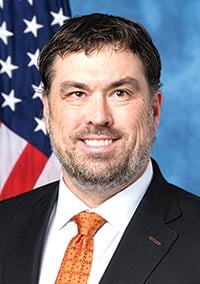Flopping isn’t just for fish out of water
 Everyone more than likely has a memory, either of the actual thing or a scene in a movie, of a father driving a car and becoming increasingly irate at the behavior of the kids in the back seat.
Everyone more than likely has a memory, either of the actual thing or a scene in a movie, of a father driving a car and becoming increasingly irate at the behavior of the kids in the back seat.
Whatever set the kids off was never found out; it was dad’s reaction that was portrayed, mostly humorously, threatening mayhem on anyone who said another thing.
Saying, “but, Dad,” only earned you a glare and possibly a profanity-laced admonition that Dad was serious.
That exact kind of response is being played out on a national scale in several areas, the latest being the Foreign Intelligence Surveillance Act, which was reauthorized by the U.S. House and now heads to the Senate, which probably will be passed.
Why this is important is that there was an amendment offered to require the government to get warrants before it begins surveillance on Americans, which failed. That means Uncle Sam can continue to become the creepy uncle no one wants at the holidays.
(As an aside, there was a part of the warrant requirement that created exceptions for “elected officials.”)
The law originally was designed to find out about illicit activities but has been used against many Americans for political reasons, essentially being the dad in the car and threatening everyone with being spied on because of the actions of other.
(Aside No. 2: the vote was dead even, and Speaker Mike Johnson cast the tiebreaker.)
Benjamin Franklin famously said that those who would give up essential liberty to purchase a little temporary safety deserve neither liberty or safety, and if you do a little research, we’ve come to that particular destination already.
Ask anyone who has lived under a communist regime about the quality of life they have. Any and everything you say and do is subject to observation by the government, and what happens after that depends on the whims of leaders. That is straight-up KGB tactics; think Moff Tarkin’s phrase “fear will keep the people in line.”
This flies in the face of so many of the most important codicils of the Constitution, but most notably, innocent until proven guilty as well as protection from unreasonable search and seizure. But it’s not the first time, and more than likely won’t be the last.
I could make the case that drug-testing athletes, especially those in public schools, is the result of the same type of reaction; a few bad apples means the whole barrel is now spoiled and everybody is under the microscope.
The same approach is being taken on guns. We don’t just hold perpetrators of crimes accountable, we’re looking to make everyone suffer the consequences.
Just like the kids in the back seat are upset to be included in being punished for something they didn’t do, we as citizens need to be just as indignant and hold the perpetrators of these blatantly unconstitutional laws accountable for their own actions and get them out of office.
Which, if the gun control crowd get their way, will never ever happen. And that is the epitome of unfair.
Tony Farkas is publisher of the San Jacinto News-Times and the Trinity County News-Standard. He can be reached at This email address is being protected from spambots. You need JavaScript enabled to view it.. The views expressed here are his own and do not necessarily reflect the views of this publication.
- Hits: 168


 Special to the News-Times
Special to the News-Times Pete Sessions
Pete Sessions By Tony Farkas
By Tony Farkas